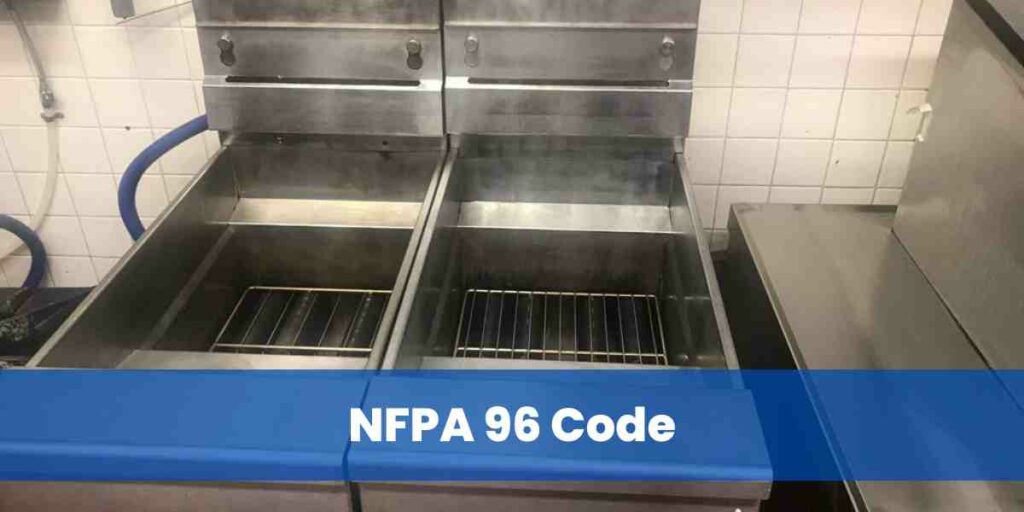NFPA 96 for Guelph Restaurants & Facilities
The trusted norm is in Guelph, Canada, the National Fire Protection Association’s (NFPA) 96 Standard for Ventilation Control and Fire Prevention in Commercial Cooking Operations. This standard guides the installation and maintenance of fire protection and ventilation systems in commercial cooking operations. It also guides the specific requirements for the design and operation of the cooking operation.
The NFPA 96 standard mandates that all Guelph commercial cooking operations be equipped with fire suppression systems, including automatic fire sprinkler systems, fire alarms, extinguishers, and hoods. This ensures safety and helps protect businesses from disasters caused by a kitchen-related blaze. It also includes requirements for ventilation systems, such as exhaust hoods, ducts, and fans. It also includes requirements for grease and smoke removal from the kitchen, such as grease traps and filters.
NFPA 96 for Guelph Restaurants and Facilities specializes in commercial restaurants and institutions. Call today for a free written estimate.
Furthermore, the policy outlines mandatory requirements for keeping fire protection and ventilation systems in check – such as testing, inspections, and maintenance intervals; additionally, staff training on the proper operation of these systems is also required. Moreover, it emphasizes design, installation, and operational needs necessary for commercial cooking operations.

Request an Estimate
Kitchen Exhaust or Hood Cleaning Estimate.
NFPA 96 Inspection Checklist
Here’s a rundown of the things an inspector looks for when checking that your Guelph-based commercial kitchen is up to NFPA 96 standards:
1. Inspect the ducts and exhaust systems for lint, dust buildup, or other combustible materials.
2. Inspect the hoods and exhaust systems to ensure they are properly secured and sealed.
3. Check the fire suppression system to ensure it is in proper working order and is not damaged or leaking.
4. Ensure that all electrical systems are properly grounded and that all wiring is up to code.
5. Check all switches, buttons, and other devices to ensure they are working properly.
6. Inspect the ventilation systems and make sure they are not blocked or obstructed.
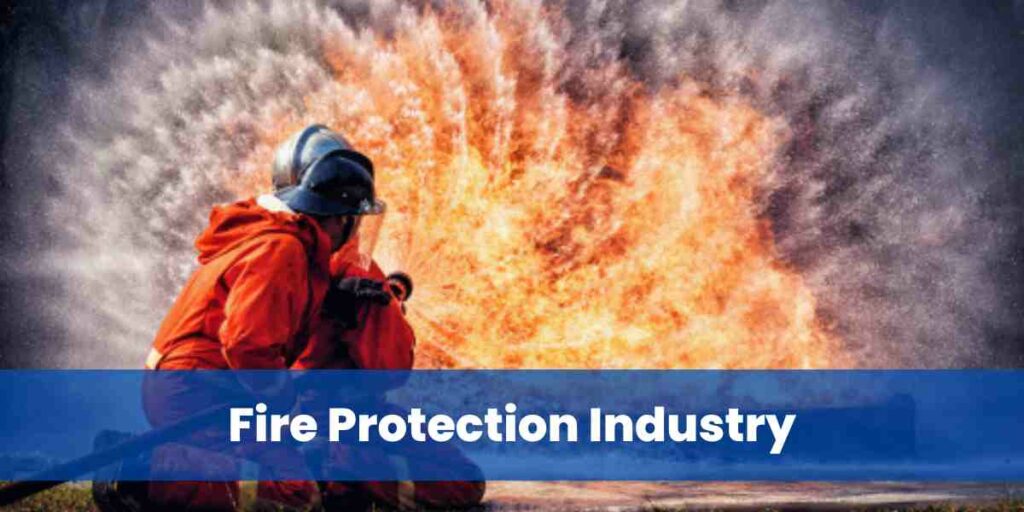
7. Verify that the fire extinguishers are properly located, charged, and in good working order.
8. Ensure that safety signs and labels are displayed in the proper locations.
9. Inspect all cooking equipment for proper and safe operation and that all guards and shields are in place.
10. Inspect all exhaust systems for proper airflow and ensure no backflow.
NFPA 96 Kitchen Hood Guelph
Complying with NFPA 96 is important because it helps ensure that kitchen hoods are installed and maintained to minimize fire risk in commercial kitchens. This includes specifying minimum clearance distances between the hood and other kitchen equipment, the size and placement of fire suppression systems, and providing guidelines for properly cleaning and maintaining the hood and its associated equipment.
By following the guidelines outlined in NFPA 96, commercial kitchen operators can help to reduce the risk of fire in their facilities and ensure the safety of their employees and customers.
Exhaust System
The NFPA 96 standard mandates that exhaust systems be professionally cleaned twice a year to reduce the risk of any fire hazards. This means scouring through vents and hoods to eliminate grease, carbon deposits, or other combustible materials from building up inside them.
Additionally, it is important to inspect all ventilation system components to ensure that the system is securely mounted and the exhaust fans are properly balanced. Ultimately, it is critical to inspect the ducting for any damage or imperfections, such as pinholes or rips, that could easily cause a fire if not detected.
NFPA 96 Standards for Guelph Restaurants
In Guelph, the NFPA 96 standards must be followed in all commercial kitchens. This includes:
• Ensuring the kitchen hood is installed at least 18 inches from combustible material and 8 feet from the cooking surface.
• Installing a fire suppression system in accordance with NFPA 17A or NFPA 96 standards.
• Verifying that all shutdown mechanisms are working properly.
• Inspecting all exhaust systems for proper airflow and ensuring no backflow.
• Installing automatic fire shutters over windows and doorways leading to the kitchen, if necessary.
• Installing smoke detectors in key areas of the kitchen.
• Providing fire extinguishers at all entrances and exits to the kitchen.
These standards will enable restaurant owners and operators to create a safe, compliant kitchen atmosphere. Moreover, it is critical that hoods and their components are kept up with regular maintenance checks, so they operate as intended.
NFPA 96 Hood Cleaning Frequency
According to the National Fire Protection Association (NFPA) 96, commercial kitchen exhaust hoods and their associated systems should be cleaned at a frequency that is based on the type of cooking equipment being used and the amount of grease that is being produced.
The standard specifies three categories of cooking equipment based on the amount of grease produced: light, medium, and heavy. Light cooking equipment produces less than 5 gallons of grease per year, medium cooking equipment produces between 5 and 50 gallons of grease per year, and heavy cooking equipment produces more than 50 gallons per year.
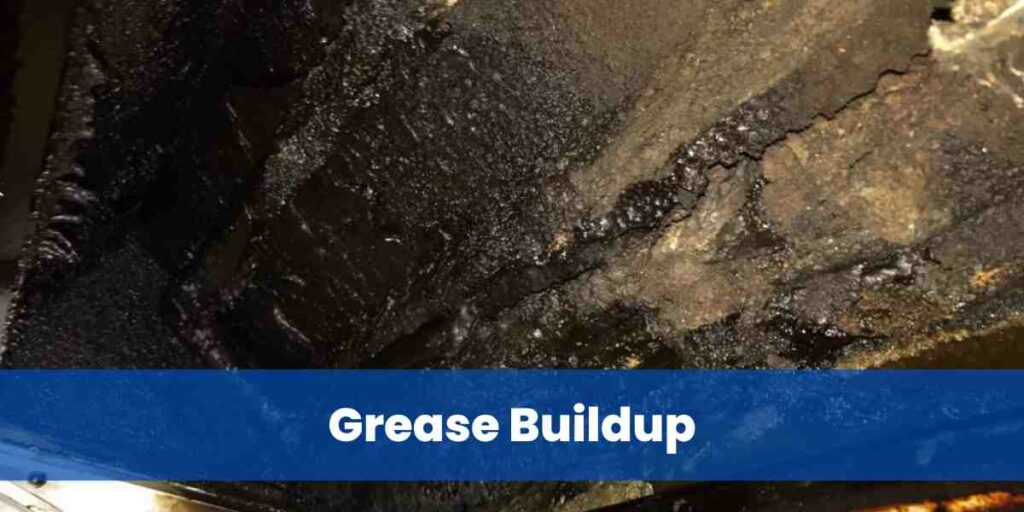
The standard also specifies the frequency at which each type of cooking equipment should be cleaned:
-
Light cooking equipment: at least every three months
-
Medium cooking equipment: at least every month
-
Heavy cooking equipment: at least every week
Not only does the standard hold restaurants to strict cleaning frequency regulations, it also requires that kitchen exhaust hoods and their components be swiftly cleaned if they become excessively oily or dirty or if a change is made concerning the type/volume of cooking equipment.
NFPA 96 Code
Complying with the requirements of NFPA 96 is a necessary step towards ensuring that commercial kitchen exhaust systems are safe and compliant.
This includes specifying the appropriate distance between the hood and combustible materials, providing an adequate fire suppression system, testing all components of the exhaust system, maintaining the hoods and associated equipment according to a strict cleaning schedule, and installing smoke detectors in key areas.
Wet Chemical Fire Suppression Systems in Commercial Kitchens
The NFPA 96 standard mandates that all commercial kitchens install an automated fire suppression system for optimal safety. The most typical type of this system is the wet chemical one, which relies on heat-activated sprinkler heads and a tailored water-based formula to put out fires with proficiency.
Class K portable fire extinguishers are required
For larger commercial kitchens and for complete coverage, these should be accompanied by a wet chemical fire suppression system. This type of system works by quickly spraying the area with a tailored water-based formula designed to smother any fires it comes into contact with quickly.
Kitchen Exhaust System
Maintaining NFPA 96 standards is critical for commercial kitchens, and that includes not only the installation of a fire suppression system but also making sure exhaust systems are in top condition.
This goes hand-in-hand with regular upkeep checks as well as consistent hood cleaning.
NFPA 96 Kitchen Hood Inspection
If a professional like Guelph Hood Vent Cleaning does a kitchen hood inspection, the foremost step is to inspect the hood’s external surfaces and the surrounding areas for any signs of fire, smoke, and other damage. The professional will then check the hood’s filters and the exhaust fan to ensure they function properly.
The experts will also check the hood’s fire suppression system for proper operation and any signs of damage or corrosion. Finally, the professional will inspect the ducts for debris and obstructions and ensure that the ducts are properly sealed.
NFPA 96 Compliant
To comply with NFPA 96, commercial kitchen operators must follow the guidelines outlined in the standard for the design, installation, and maintenance of their kitchen ventilation systems.
Familiarize yourself with the requirements outlined in the standard, including the minimum clearance distances between the hood and other kitchen equipment, the size and placement of fire suppression systems, and the cleaning and maintenance requirements for the hood and its associated equipment.
Work with a qualified contractor to design and install a ventilation system that meets the standard’s requirements. This may include installing a kitchen hood, ductwork, and a fire suppression system.
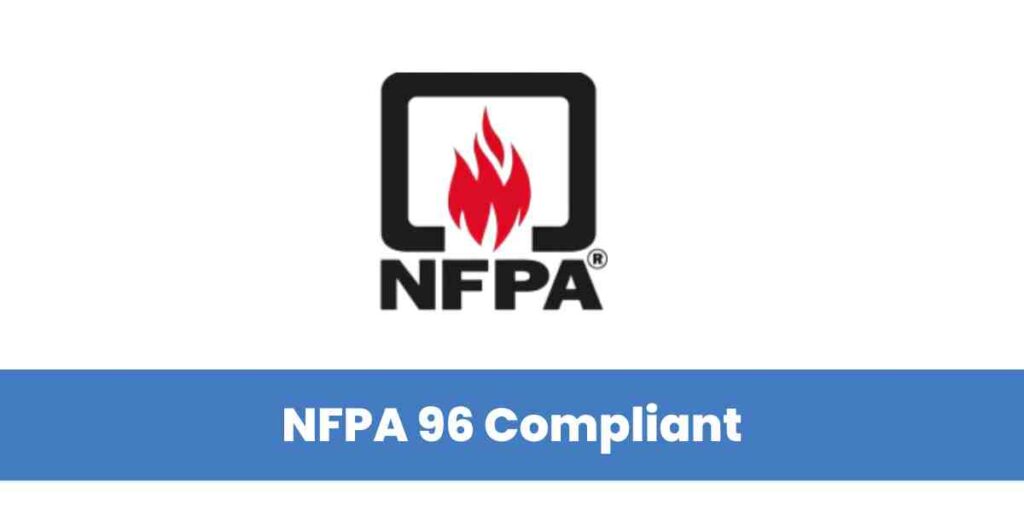
Follow the cleaning and maintenance requirements outlined in the standard to ensure that the ventilation system is in good working order and able to effectively remove smoke, heat, steam, and cooking odours from the kitchen. This may include regularly cleaning the hood and its associated equipment and inspecting and servicing the fire suppression system.
Keep records of the ventilation system’s design, installation, and maintenance to demonstrate compliance with the standard. This may include design drawings, installation and maintenance reports, and cleaning logs.
NFPA 96 Hood Cleaning in Guelph
Guelph Hood Vent Cleaning is the perfect choice for Guelph businesses looking for NFPA 96-compliant hood cleaning services.
Our team of skilled technicians is available to provide comprehensive kitchen exhaust system installations and regular maintenance services that ensure your restaurant adheres to the NFPA 96 standards.
National Fire Protection Association
The NFPA standards exist to ensure that commercial kitchen operators provide safe, healthy, and comfortable working conditions for their employees.
They are created with the help of experts in fire protection and other related fields who come together to create a set of guidelines for businesses to follow.
Fire Sprinkler Systems in Guelph
Commercial kitchens, such as those found in hotels and restaurants, must set up fire sprinkler systems to meet NFPA 96 standards. Fire sprinkler systems are designed to detect and extinguish fires before they become out of control and spread rapidly.
Guelph Hood Vent Cleaning will install fire sprinkler systems in Guelph. We will ensure that the system is correctly installed, meets all relevant safety codes, and is equipped with the necessary safety components. We will also ensure that any additional equipment needed for the proper functioning the fire sprinkler system is installed and tested.
Suppression Systems for Guelph Restaurants
Suppression systems are designed to detect and extinguish fires quickly, often before they spread. NFPA 96 and local fire safety codes require that restaurants install a suppression system in their kitchen exhaust hood systems. Guelph Hood Vent Cleaning is experienced in installing suppression systems in Guelph restaurants.
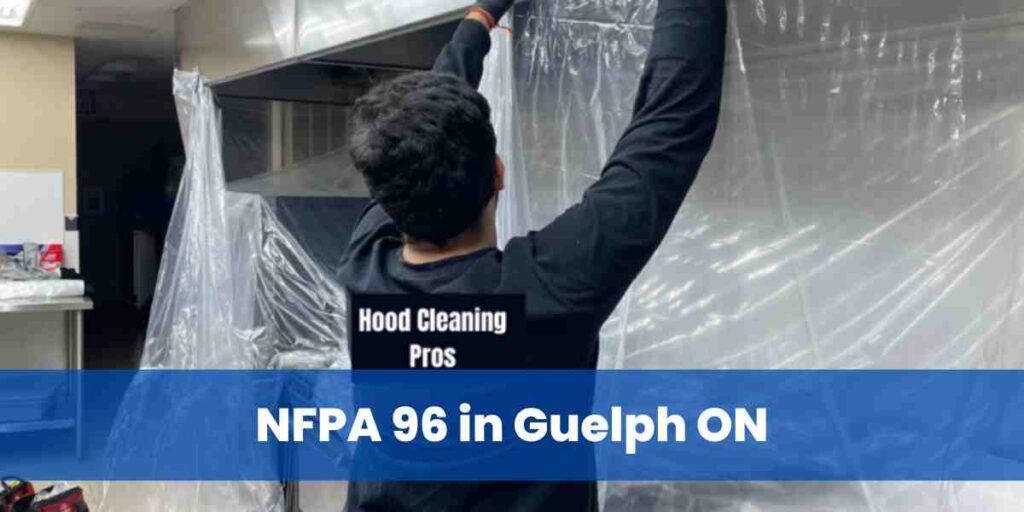 Request an Estimate [Tap Here]
Request an Estimate [Tap Here]Portable Fire Extinguisher
The small, unassuming fire extinguisher is often the first line of defence against an unexpected kitchen fire. NFPA 96 requires that establishments have at least one Class K-rating portable fire extinguisher in their kitchens.
Guelph Hood Vent Cleaning can help you select the right size and type of portable fire extinguisher for your specific requirements.




